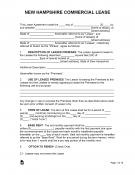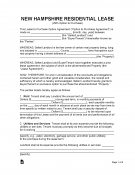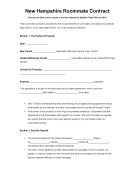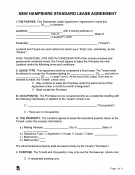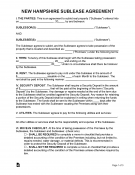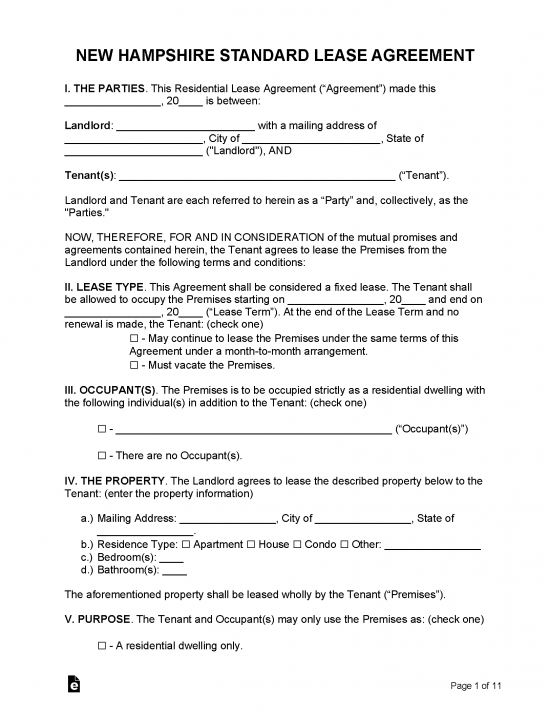New Hampshire lease agreements contain the terms that govern a tenant’s lease of a landlord’s property. The agreement should be written down, signed by both the landlord and the tenant, each of whom should keep a copy, and contain essential information, such as the amount of the monthly rent and which party is responsible for utilities. It can also contain other terms, such as the property’s policy on pets.
Contents
By Type (6)
- Commercial Lease Agreement
- Month-to-Month Lease Agreement
- Rent-to-Own Lease Agreement
- Roommate Lease Agreement
- Standard Lease Agreement
- Sublease Agreement
Download: Adobe PDF, MS Word, Rich Text Format
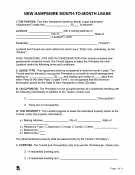 Month-to-Month Lease Agreement
Month-to-Month Lease Agreement
Download: Adobe PDF, MS Word, Rich Text Format
Download: Adobe PDF, MS Word, Rich Text Format
Download: Adobe PDF, MS Word, Rich Text Format
Download: Adobe PDF, MS Word, Rich Text Format
Download: Adobe PDF, MS Word, Rich Text Format
Landlord-Tenant Laws
Statutes – New Hampshire Statutes, Title 540 (Actions Against Tenants), Title 540-A (Prohibited Practices and Security Deposits)
Required Disclosures (3)
Lead-Based Paint Disclosure – Federal law mandates that all landlords disclose to tenants renting properties with dwelling units built before 1978 that lead-based paints are hazardous to health.
Move-in Checklist – Upon receiving a security deposit, a landlord must notify tenants that, for purposes of evaluating how much of the security deposit shall be returned, the tenants need to inform the landlord of problems with the unit or needed repairs within five (5) days of moving in. The tenant’s notice to the landlord of issues must be in writing, either on the receipt below or using a checklist like this one. (§ 540-A:6(I)(b))
Security Deposit Receipt – Landlords must provide a receipt for security deposits, unless the payment is made via check. (§540-A:6(I)(c))
Security Deposit Laws
Maximum Amount ($)
Landlords may require a security deposit of no more than the greater of $100 or one (1) month’s rent. (§540-A:6)
Returning to Tenant
Landlords must return the security deposit, along with any interest it has accrued during a tenancy, within thirty (30) days of the termination of the tenancy. Landlords may retain a portion of the security deposit to account for owed rent, taxes or fees that are unpaid but which the lease agreement specified were the tenant’s responsibility, or the cost of repairs to the property beyond normal wear-and-tear. If the landlord desires to retain any of the security deposit, the landlord must provide the tenant with a written itemization of all deductions, also within thirty (30) days of the termination of a tenancy. (§540-A:7)
When is Rent Due? (grace period)
State law does not specify a rent due date or a grace period, which means that rent is due on the date named in the lease agreement.
Eviction Notice (non-payment)
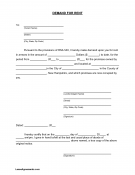 7-Day Notice to Pay or Quit – If a tenant fails to pay rent on the date it is due, the landlord may give the tenant a demand for rent, alerting the tenant that, if the tenant does not pay all rent owed within seven (7) days of the delivery of this demand, the landlord may terminate the lease. If the tenant fails to pay and the landlord does terminate the lease, the landlord may serve this Eviction Notice on the tenant. (§540:3)
7-Day Notice to Pay or Quit – If a tenant fails to pay rent on the date it is due, the landlord may give the tenant a demand for rent, alerting the tenant that, if the tenant does not pay all rent owed within seven (7) days of the delivery of this demand, the landlord may terminate the lease. If the tenant fails to pay and the landlord does terminate the lease, the landlord may serve this Eviction Notice on the tenant. (§540:3)
Download: Adobe PDF
Maximum Fees ($)
Late Rent Penalties
New Hampshire statutes do not restrict landlords from imposing late fees, but do not offer guidance on how much those fees can be. As a result, if a landlord wishes to impose a fee for late rent, the fee should be named in the lease agreement, and must be reasonable.
NSF Checks
New Hampshire statutes do not specify whether landlords may impose a fee for offering a rent check that bounces. Best practice, if a landlord wishes to impose a fee, is to name the fee in the lease agreement, and for the fee to be reasonably related to the cost imposed on the landlord by receiving a bounced check.
Tenant’s Unclaimed Property
If a landlord finds personal property in a dwelling unit after the tenant has vacated the property, the landlord must maintain and exercise reasonable care in storing the property for seven (7) days. The landlord must make reasonable accommodations for the tenant to reclaim the property. If the tenant fails to recover the property within seven (7) days, then the landlord may dispose of the property. (§ 540-A:3(VII))
